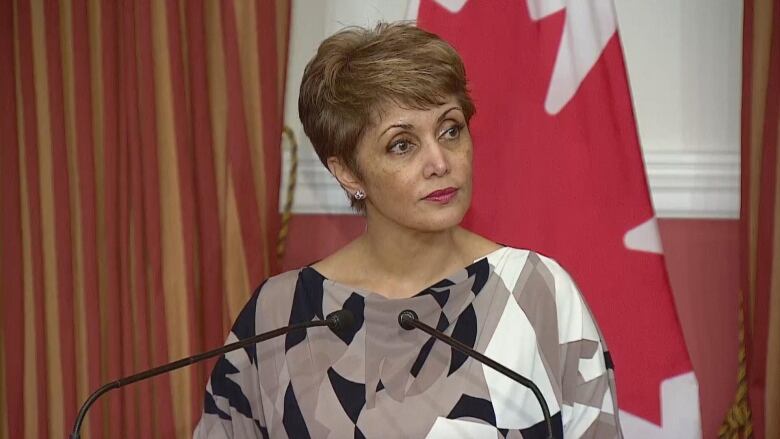Calgary rakes in extra $47M from access fee on power and gas bills, debates how to spend the cash
'It's time to look at the utility and what we can do,' says mayor

Last year's spike in utility bills resulted in a $47-million windfall for the City of Calgary, and some members of council are exploring ways that money could benefit those hit hardest by soaring energy costs.
"We're seeing inflation at an all time high and people in some pretty precarious positions — potentially losing housing, losing power," said Mayor Jyoti Gondek.
"I will tell you that the majority of us want to figure out how we get this right."
The extra cash is in addition to what the city normally gets from the Enmax dividend. It's from an 11 per cent tax historically added to every electricity and natural gas bill.
That tax brought in $241 million in 2021, up from $194 million in 2020, according to annual financial statements presented at council's audit committee last week.
'Someone needs to do something'
Many Calgary residents are struggling to pay the increased power and gas bills. Enmax won't say how many have had their power cut off or limited, but the Trellis Society reports that the annual emergency funds set aside to prevent families from losing their homes in the crisis is running low.
This one-time basic needs fund of $150,000 provided by Enmax to Trellis in December had already been depleted to less than half by the end of March.
The Distress Centre/211 Calgary and the Alberta Utilities Consumer Advocate have also reported a spike in calls for assistance this year.

"Someone needs to do something," said Emma Koreen, a mother of five whose husband wasn't able to work last year. They have a small home-based business but it's not enough to make ends meet.
The one-time help she accessed at the end of last year kept the lights, but the bills aren't going down. And since she fell behind once, she needs to find at least $400 for a deposit before she can access a contract with fixed electricity rates again.
"The last couple of years have been really hard on us. We're not the only ones. People are still struggling now. We're really struggling now," said Koreen, who first shared her story with CBC Calgary through our texting community.
"One-time, short-term help from the city — that's fantastic. But I'm just going to be right back in this position in a few months' time."
What should the city do?
CBC News spoke with four members of council about the extra cash collected this year.
Gondek said increased utility rates and fees have led to a dire situation for a lot of Calgarians. The city could reinvest any financial benefit gained through these fees back into the community through support programs, and there's precedent for that. In past moments of crisis, like the hailstorms of 2020 and 2021, the city created specific rebates.

"What kind of programming can we offer to people so that if they need to access a reduced rate or if they need to access some sort of relief, that we have that in place?" Gondek said. "I think it's time to look at the utility and what we can do."
On the utility bill, these fees are labelled municipal consent and access fee or franchise fee.
The city collects the fee from both Enmax and ATCO — the two companies with monopolies on distributing the electricity and gas to houses in Calgary (even if a household buys energy from a different retailer). It's based on the regulated or floating rate, even if a household has chosen to lock into a fixed rate.
But what goes up can also come down.
Coun. Andre Chabot said that's why council shouldn't rely on this fee to run any on-going programs.
"If we try and reallocate some of those funds or lower the franchise fee (and then rates go down), what will end up happening is we'll have to increase residential tax rates to offset that loss of revenue," said the Ward 10 councillor. "We have seven revenue streams. This is one of them."
Capping city bonus revenue
Others argue the fee shouldn't be able to fluctuate so much.
"The energy rate increase shouldn't be an unmitigated bonus revenue to the city," said Ward 7 Coun. Terry Wong.
He'd like to see a floor and ceiling limit in place on these fees.
"So that if the price of a commodity — in this case, utilities — drops below a certain level, we maintain a certain revenue stream from franchise fees," Wong said. "Similarly, if the price goes up unexpectedly, as it has recently, there should be a cap."
At Thursday's audit committee, city officials said the fee currently goes to general revenue. When it's higher than budgeted, the practice is to put that in a reserve fund for future capital projects.
This year, council has already allocated at least some of the extra cash. In March, before councillors knew the total surplus, they voted to set aside an unspecified amount to boost the noise barrier retrofit program.
Coun. Evan Spencer, representing Ward 12, says he knows there is an appetite among council right now to find a solution for those struggling with these increases, but, like many Calgarians, he's still learning about a very complicated industry.
"Ultimately, the revenue is finding its way back to Calgarians through the City of Calgary. But in terms of striking that right balance, I'm not sure yet. There's more to discover and unpack."
Facing down utility bills
Calgary residents have been helping CBC Calgary report on utility prices through a text-messaging community. They share utility bills, personal stories and questions to help shape this project.
Are these rates stretching your budget? Join us by adding your cellphone number below.
It's confidential. Unsubscribe at any time.
Series produced by Elise Stolte

